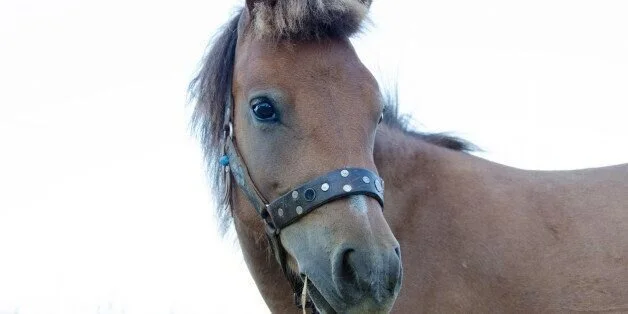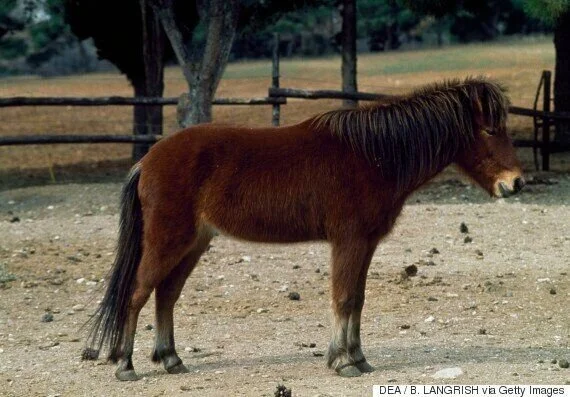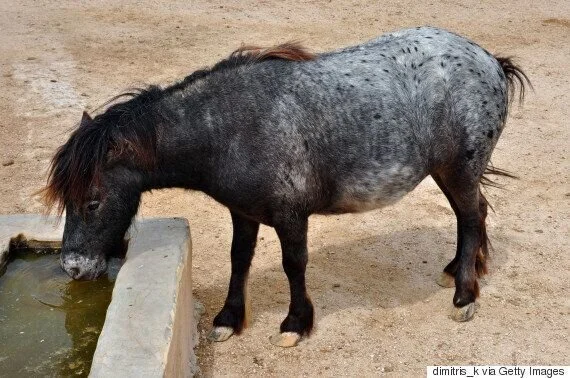They may be small, but the horses of Skyros - or Skyrian horses- are very strong, compact and have a "heavy" heritage that is said to go back to ancient times.
STRATOSGIANNIKOS VIA GETTY IMAGES
The small bodied, greek, Skyrian horse is one of the rarest horse breeds in the world. Skyros island, Greece.
Because of its small size, the small horse of Skyros is considered by many to be one of the ponies, but its characteristics refer to the larger horses and not to the ponies of Northern Europe. As underlined on the website of the Skyros Horse Breeders Association, it is one of the rarest horse breeds in the world and one of the indigenous Greek horse breeds that existed throughout Greece in ancient times. It managed to survive on the island of Skyros, hence the name. It is a protected species, as it survives only in a small number, exclusively in Greece (300, according to National Geographic, 260, of which 187 live on Skyros, according to the Union's website).
Skyrian horses are companion animals, sociable, strong, smart, with a very friendly attitude towards children. Their legs are thin, strong while the tail is low set, tufted and long. It often reaches the hooves that are small, hard, usually black. Its distinguishing feature is the hair on its hooves, called "feathers". The color of the horses is usually in shades of brown-red and brown, rarely of white or gray-brown (gray) and rarely of blond. Although calm and friendly to its owner and children, the Skyrian horse is quite lively and nervous, while it has a strong wine and is a low-fat diet, which allows it to survive in environments such as Skyros.
The ancient horse breed of Achilles and Alexander
As mentioned earlier, this is an indigenous Greek horse breed - and therefore the Skyrian horse and its history are intertwined with Greek history and legends: It is recalled that ancient Greek horses were not very large or tall, but were known for being compact and strong. It is said that the Skyrian horse is a descendant of the horses Achilles took with him to Troy: Xanthos and Valios, the horses that pulled the hero's chariot, were immortalized by Homer, but also by K. Kavafis in "The Horses of Achilles''. According to legend, Poseidon had given them as a wedding gift at the wedding of his parents, Peleus and Thetis. Their parents were Podargi and Zephyrus, and they were immortal.
Automedon tames the horses of Achilles. Henri Regnault - Sablin Alexander
The breed is also believed to be related to the horses of Alexander the Great: it was recalled that Bucephalus - the horse the Macedonian king loved and accompanied to India in his old age - is described as a rather small but very stocky Thessalian horse, characteristics that were eventually shared by most Greek horse breeds. Other theories associate the Skyrian horse with the horses that appear in the Panathenaic procession in the frieze of the Parthenon. In any case, according to an article from National Geographic, whether or not these theories are valid, the evidence shows that this is a breed that has survived in isolation in Greece for thousands of years.
As for their origin, they are thought to be related to mountain breeds of small horses that migrated from Alaska along the Asian Mountain Range and arrived in Europe 12000 years ago. It is estimated that the Athenians brought them to Skyros in the 5th century BC.
The greatest threats to the Skyrian horses are overgrazed pastures, uncontrolled reproduction, failure to encourage horse ownership, and occasional poor horticultural practices. It was a common phenomenon for owners to allow their donkeys and mules to run free, leading to uncontrolled reproduction and the birth of many mules instead of horses.












